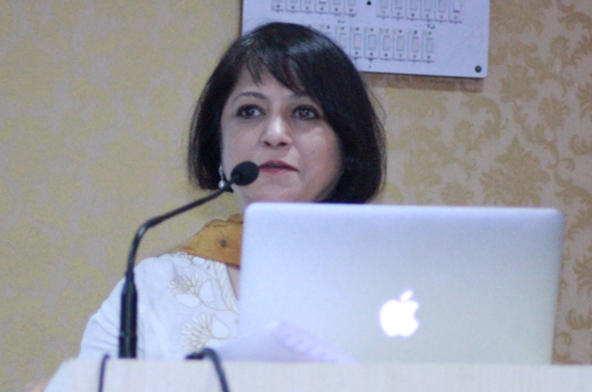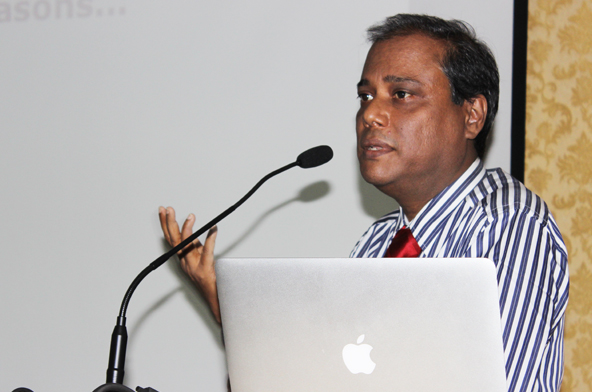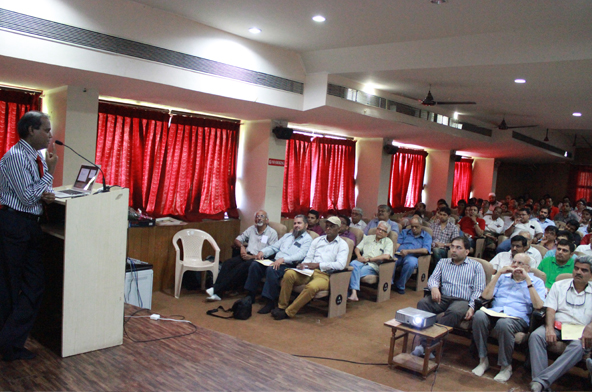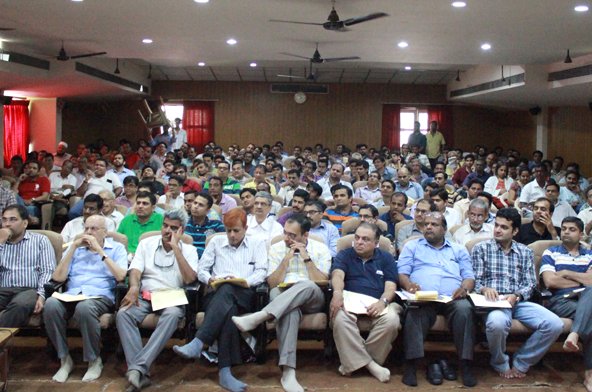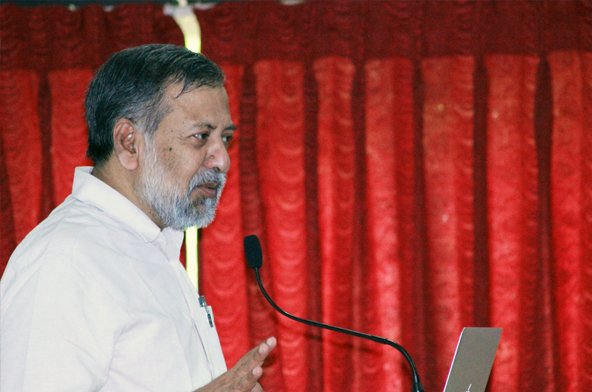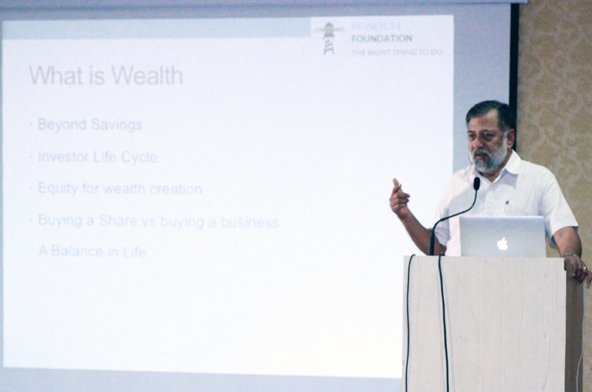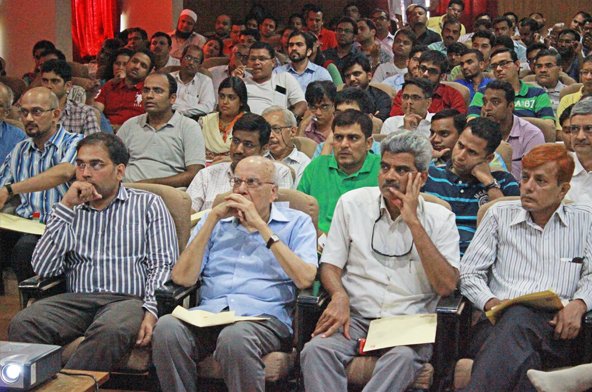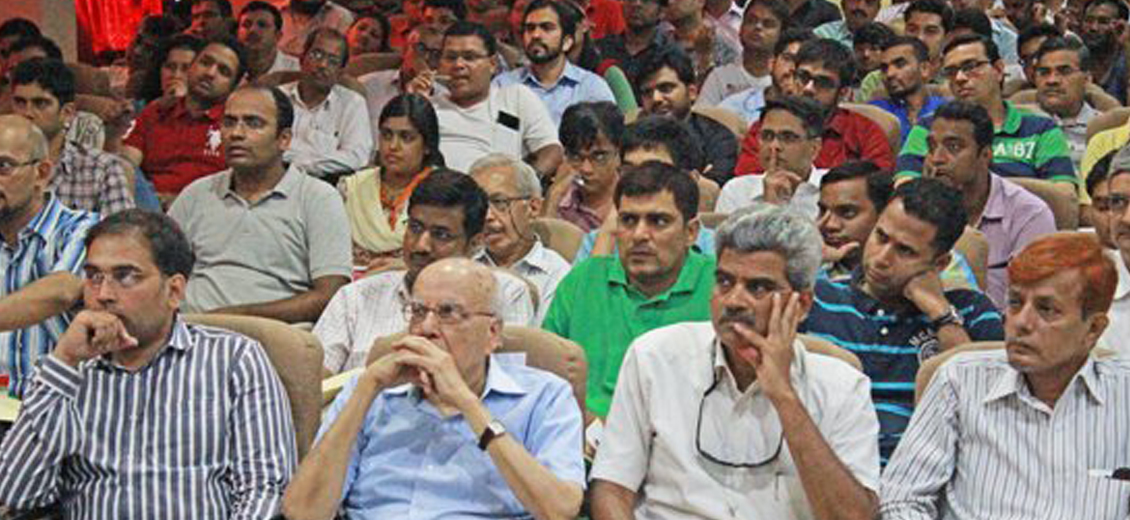
Moneylife Foundation hosted an exclusive event for its members in Pune on investing in stocks. The event titled “Stocks for Building Long Term Wealth” included two sessions. In the first session, Debashis Basu, editor and publisher of Moneylife, explained major differences between stocks and mutual funds. In the second session, R Balakrishnan, a regular columnist for Moneylife, educated the audience on how to pick the right stocks.
Investors are always riddled with the question whether they should invest directly through stocks or through an equity mutual fund. Mr Basu, in his session explained that though equity funds offer a diversified portfolio, in principle they as similar to holding individual stocks. Both are volatile and can fall sharply leading to a loss of capital, he said. Those who have no time and interest to analyse individual stocks should go for equity funds. Equity funds would be ideal for those who are just beginning to invest and are looking to invest small amounts.
Certain investors do have a misconception about equity funds, as they offer different themes, professional fund management and liquidity. However, with over 300 equity fund schemes available, the risk of choosing a wrong equity fund is just the same as picking a wrong stock from a basket of 300-odd quality stocks, Mr Basu added.
He said, “Stocks score over equity funds in terms of costs. Costs eat in to an equity fund returns. Equity fund charge an expense ratio, which is their fees in terms of a percentage of the corpus they manage. This is deducted from the corpus on a daily basis. The fees charged can range between 1.25% and 3% per year. In percentage terms, it may seem very low, but as your corpus grows, you are paying higher fees in percentage terms and the costs for holding stocks remains fixed and transactions costs are low as compared to equity funds.”
In terms of stock selection too, equity funds are not very efficient, Mr Basu said, adding, they (funds) stick to the same basket of stocks and are heavily weighted to their benchmark index stocks. Most equity funds have the same stocks in their portfolio. Mr Basu gave an example how nearly 86 of the 200-odd actively managed schemes hold Reliance in their portfolio. The main reason for holding this stock is because it is a heavy weight on the index.
To win at stock picking, Mr Basu said that one should pick good quality stocks and hold them for the long term.
Mr Balakrishnan explained how to pick such stocks in the next session.
The average investor has no clue about what he is buying or selling. S/he survives in the stock market mainly because of luck. The ones who do survive may have done so because of some skill or just luck. Mr Balakrishnan, who has over three decades of experience across banking, credit and capital markets, explained to the packed audience on how one should drown out the noise and evaluate a company using by crunching a few numbers.
He pointed out that when an investor buys a stock, s/he becomes a part owner of the company. One should understand the business of the company, the sustainability of growth over the next five years or so. To be on the safer side, one should pick companies, which have a history of more than 10 years, over which at least one business cycle is complete.
More importantly, the investor should look at the company’s management, whether the goal of the promoter aligns itself with the goals of the shareholder. “Look at the nature of companies, the trustworthiness and goodwill of promoters along with cash flows and future of business the companies have,” advised Mr Balakrishnan.
He said, “An average investor has generally no clue about what he is buying or selling. His long-term investments or holdings are often an outcome of a short-term trade he initiated which went bad. He simply hates to sell below the price at which he bought.”
Using a detailed spreadsheet, Mr Balakrishnan explained how one can analyse the profit and loss account and the balance sheet of a company. To analyse such data, he said, one needs to divide it into three groups, earnings, the assets & liabilities and the cash flow. He also, pointed out that while short-listing companies, two most important ratios one should look at is the return on capital employed (RoCE) and return on equity, also know as return on net worth (RoNW).
For those who dread numbers, Mr Balakrishnan says, “If you cannot go too deep in to the accounts, you should stay focused at least on one thing, namely, management quality. To me, the quality of management is perhaps the single most important factor in an analysis. Ultimately, when we buy a share, we are becoming a part-owner of the business that is run by someone. We are dependent on them to deliver. However good a business or industry, it cannot be better than the people at the helm.”
“Invest in stocks only if you have money to spare,” cautioned Mr Balakrishnan. “Don’t invest in stocks with money which is very important for you, to use it for a child’s education or marriage. In that case, don’t risk your hard earned money in stocks, keep it safe even though may earn lower returns on it”.
Also, remember when investing in stocks, Mr Balakrishnan said, “Returns may not come when you want it. Stock prices are decided by many factors none of which controlled by us.”
“If you wish to invest in stocks you should devote at least an hour a week to understand the business of the company and the financial statements,” he said.
The programme ended with a lively interaction with the audience.


